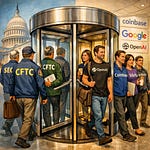Good morning from a Lisbon balcony. Sun on the tiles, coffee cooling too fast, and a cinnamon-sugar donut that’s making me rethink my usual “plain cake only” stance. Today isn’t a market rundown. It’s a rant about something more basic: privacy—why we keep surrendering it, who’s really cashing in, and why the burden keeps getting shoved onto you and me instead of the folks building the surveillance machine.
Yesterday someone recognized me and asked for a quick Bitcoin take. I asked the usual: do you care about self-custody, transparency, privacy? The answer was, “I just want to make money.” That’s most people. But it’s not why I’m here. The longer I’m in this space, the more privacy—imperfect and messy as it is—matters. “Bitcoin is not private. We know that.” But the point is bigger than coins. It’s about the entire data exhaust trailing us everywhere.
“It’s for Safety.” The Oldest Trick in the Book
Every erosion of rights comes with a ribbon labeled safety. That’s the Trojan horse.
Take London. I couldn’t even log into hotel Wi-Fi without dropping a name and email. No password. No anonymous access. Just, “Who are you? Prove it.” If you wanted to watch certain categories of content—adult content, violent films—you were asked for government ID. And Ohio just rolled out the same thing for adult sites.
On the surface, it’s packaged as “protection”—protection from terrorists, protection for children, protection against the vague dangers of the internet. The problem is, safety is the most flexible justification ever invented. It’s the same script every government runs: you’re too irresponsible, so we’ll manage the risk for you.
But notice the sleight of hand: safety is always temporary, conditional, and reactive. Once you’ve built the surveillance machine, it doesn’t roll back when the crisis fades. The cameras don’t come down after the “incident.” The databases don’t delete themselves. Safety metastasizes into permanence.
And here’s the real conflict: lots of people will nod and say, “Privacy is a fundamental right on the internet”—but the second it’s something they dislike, they carve out an exception. “Yes, privacy—except for porn.” “Yes, privacy—except for misinformation.” “Yes, privacy—except for [fill in the blank].”
But privacy is binary. It’s either a right, or it isn’t. If it’s conditional, it’s not privacy—it’s permission.
If You Have Nothing To Hide…
That phrase sounds clean until you scratch it. “If you have nothing to hide, why care?” It flips the entire presumption of innocence. Suddenly you’re on trial in your own life. The burden shifts: prove you’re clean, or we’ll assume you’re guilty.
And surveillance doesn’t just observe—it changes behavior. It’s the panopticon effect. Put a camera in a break room, and workers start acting stiff even if they weren’t doing anything wrong. Put cameras on every street, and you don’t just reduce crime, you reshape the way people live. They self-censor, they self-limit. Even if you’re not breaking the law, you don’t want to be misinterpreted as doing so.
This is where context collapse becomes lethal. A 10-second clip, a half-sentence from a private chat, a Google search taken out of time—once stripped of context, the meaning warps. The public doesn’t get nuance. Employers don’t care about nuance. Regulators definitely don’t care. And in a world of constant tracking, everything is ripe for misuse.
So no—the “nothing to hide” argument doesn’t cut it. Privacy isn’t about hiding. It’s about protecting yourself from being defined, framed, and judged by systems that don’t know you and don’t care about context.
Blackmail, Breaches, and the Adult-Site Trap
Nowhere is the privacy trap more obvious than in tying your government ID to your porn habits. That is a recipe for abuse.
We’ve seen it in every industry: hospitals hacked, Equifax breached, crypto exchanges leaking KYC files. What happens next? The data gets zipped into CSVs and dumped onto Reddit, 4chan, or the dark web. Searchable. Shareable. Permanent.
Imagine the fallout: a boss, a political opponent, or just a troll searches your name and suddenly has a log of what you watched and when. Even if it’s not illegal, even if it’s just normal human curiosity—once it’s tied to your identity, it can be weaponized.
As I said live: “Don’t tell me this shit isn’t going to get hacked.”
We’re Doing KYC for Everything—And Creating Honey Pots
Know Your Customer. Anti-Money Laundering. These acronyms sound like common sense—until you realize what they actually create: centralized honey pots of identity data.
Every new app wants your driver’s license scan. Every exchange needs your passport. Every new compliance layer ends up in the same place: a giant, target-rich vault of IDs. And the more of these vaults we build, the more catastrophic the breaches will be.
Add AI into the mix, and the problem compounds. Deepfakes and voice clones make social engineering exponentially easier. A scammer with your ID, your selfie, and a model trained on your voice can walk right into half your accounts.
We’ve already seen how fragile human defenses are. Remember the Coinbase staff hack? Attackers socially engineered employees, got inside systems, and walked out with customer data. Once a single vault exists, it isn’t if it gets abused. It’s when.
KYC doesn’t eliminate risk. It centralizes it.
Face Maps, Everywhere
I had to scan my face for the UK’s ETA visa. Not a photo. An infrared dot-matrix map that captured my features in 3D. That biometric signature is now stored god-knows-where, cross-referenced against citywide cameras in London—the most surveilled city in the world.
Once a government has your faceprint, you’re no longer an anonymous body in a crowd. You’re a tracked dot, matched across cameras, linked to movement history. And it’s justified as safety. Safety from terrorism, safety from crime. But what happens when “safety” mutates into “control”? When dissent is tracked, when protests are mapped, when facial data becomes the first layer of political profiling?
This isn’t sci-fi. It’s operational today.
It’s Not Just Governments—It’s Privatized Surveillance
Here’s the American twist: we outsource the panopticon.
We’ve turned front porches into surveillance nodes with Ring. We’ve turned malls into tracking hubs with Bluetooth beacons. Cars log every trip, every turn. App SDKs slurp location and habits. It’s a web of private pipes that end up in the same place: mass surveillance.
And it’s not just big tech. There are companies literally leasing surveillance boxes to small towns. Portable license-plate readers with cameras that sit on streets, tracking every car that enters or leaves. Make, model, plate number, even passenger headcount. Sold as “keeping outsiders away” or “community safety.”
This isn’t hypothetical. This data sits on servers. It can be queried, subpoenaed, sold, or leaked. It can make you a suspect in the wrong context, shift the burden of proof, or simply end up bundled into an ad profile.
Safety is the sales pitch. Tracking is the product.
Your Car Is Snitching Too
Ford got caught selling driver telemetry to insurance companies. Night driving? Unsafe. Hard braking? Reckless. Sharp cornering? Risky. Result: your premiums rise.
Did drivers consent? Technically, yes—by clicking OK on the digital terms when they drove off the lot. In reality? No one knowingly signed up for that. This is the template: collect first, monetize later, blame the customer for “agreeing.”
The car, once your private tool of mobility, has become a rolling surveillance box. It doesn’t just get you from point A to point B. It informs insurers, marketers, and whoever buys the data how you got there, when, and how often.
The Recycling Lie—But For Data
Remember recycling? Corporations in the ’70s and ’80s shifted the entire plastic crisis onto consumers. “You’re ruining the planet—recycle harder!” Meanwhile, they kept producing trillions of bottles and printing the little triangle on the bottom, knowing half of it would never be recycled.
Privacy today is the same scam. Companies build an extractive surveillance economy, then say: “Protect yourself. Get a VPN. Change your settings. Opt out.”
Sure, do the basics. But let’s not pretend the burden belongs to individuals who never consented to this ecosystem. Ninety percent of people don’t even know what happens with their data, let alone have the tools to stop it.
Just like with plastic, the companies engineered the mess, profited from it, and then turned around and said: “It’s your fault.”
There’s a Better Way: Prove Only What’s Needed
We don’t need to keep uploading IDs for every gate on the internet. The technology already exists to solve this elegantly: zero-knowledge proofs.
The bar example says it all: to buy a drink, the bartender doesn’t need your home address, your organ-donor status, your eye color, or your weight. They only need to know if you’re 21+. A ZK proof answers that question—yes/no—without handing over anything else.
In crypto, this conversation has been live for a decade. Zero-knowledge age checks, proof-of-membership systems, anonymous credentials—they all exist. What’s missing is political will and corporate adoption.
Instead, we’re stuck with “Upload your ID.” Lazy at best. Predatory at worst. Because once your ID is tied to that behavior, it doesn’t just sit in a database. It becomes leverage. For ads. For profiling. For blackmail. For control.
My Take
Privacy is already a trailing indicator; by the time we feel it slip, the system has normalized the extraction. We are post-privacy in practice, and the “but it’s for safety” escape hatch has become a permanent business model. We should stop letting policymakers and platforms hang it around our necks like it’s a personal failing. As I said live: “There isn’t any privacy… privacy is dead. Let’s stop blaming the individuals. Let’s start blaming the government.” And I’ll add: blame the corporations that engineered the incentives and lobbied to keep them. Build laws that forbid unnecessary collection and mandate privacy-preserving proof. Reward companies that implement ZK age checks, ephemeral logs, and local processing. Penalize those who keep turning people into product.
Until then, treat “Upload your ID” as a risk decision, not a box to tick. Once your legal identity is stapled to a sensitive behavior, you don’t control the downstream. That’s not paranoia; that’s the breach-timeline talking.
Happy HODLing, Everyone.












